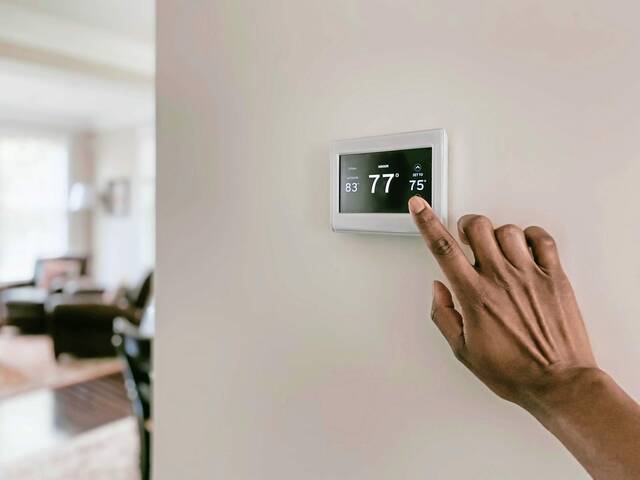When it’s hot outside, the instinct of some is to lower the temperature on the household thermostat.
But local HVAC repair experts advise against dropping the settings too low.
“Air conditioning controls humidity, not temperature,” said David Demilio, owner of Demilio Heating and Cooling in South Greensburg. “In the long run, you don’t need to keep your house cold. Seventy-four to 75 degrees Fahrenheit during the day is very good.
“The more you turn it down, the longer it’s going to run, and the more costly it’s going to be.”
Turning down the thermostat to 70 or lower, Demilio said, is more likely to overtax the air conditioning system over time than make the house more comfortable.
“I highly recommend (getting it to) a comfortable temperature and leaving it set,” said Ben Vokes, owner of Ben’s Plumbing, Heating & Remodeling in Lower Burrell. “I have customers who run their house on 70 degrees, and that’s nuts. If you set it there, and it sits there, and it has been there for four days, it does work a little harder, it will move up, but it’s still costing more energy to maintain at that lower temperature.”
Upping the temperature slightly during high heat periods can help balance things out, Vokes said.
“When it’s 90, bump the temperature up a few degrees so the air conditioner doesn’t have to work too hard during the high part of the day. It will catch up easier, and then, as the temperatures change, you can move the thermostat down a few degrees.”
Staying smart while keeping cool
Both HVAC experts recommended getting the air conditioning checked and serviced once a year to make sure it is functioning properly.
“Getting it cleaned and getting it serviced means a lot,” Demilio said. “There’s a condenser on your air conditioner outside, and if it’s clogged with dirt, it’s going to run hot, it’s going to run longer and it’s going to use more electricity.”
Vokes said keeping windows shut can help increase efficiency.
“One of the biggest mistakes people make is when it cools off, they open up all the windows, and let all the humidity back in the house,” he said.
Ashley Macik, spokesperson for Duquesne Light, said installing a smart thermostat can allow homeowners to schedule temperature changes based on the time of day and when they will be away from home. She also emphasized making sure air-conditioning unit filters are replaced when appropriate.
West Penn Power spokesman Todd Meyers advised people to try setting the air conditioner one degree higher than usual. He also recommended customers take advantage of other ways to stay cool alongside using air conditioning, such as using fans, which use less electricity.
“For every degree that you can set that air conditioner higher in the summertime, if you’re comfortable at 74, that means setting it at 75 degrees, and you would stand to save about 3% on your electric bill,” he said. “That’s a key to saving some dollars and helping preserve the equipment. If you can raise it 3 degrees, you’re getting closer to 10% electricity savings.”
Warm days, increased strain
As homeowners, businesses and renters turn on their air conditioners over the summer, the load on the power grid increases, said Brandon Grainger, professor in the department of electrical and computer engineering at Pitt.
“As one house starts to turn on their AC, and then another, you’re putting more load on the system,” he said. “What the utilities are always trying to do is balance the amount of load they can have, load being the amount of electricity you consume, versus the amount of electricity they are generating.”
Grainger compared the process to balancing a two-sided scale. When the load outweighs power generation, issues such as power outages can arise.
Higher temperatures can especially put more pressure on the energy grid when it is hot at night, Meyers said.
“The one thing we haven’t seen yet this year is when we see nights that are in the 80s and the humidity is very high, and the equipment runs hour after hour nonstop for days on end,” he said. “The temperature of electricity going through wires is very hot. When the air doesn’t cool and the humidity is high, that is when you can start to see loads that can break equipment.”
National Weather Service meteorologist John Darnley noted that while other parts of the country have been hit by more severe heat waves, the Pittsburgh region isn’t due just yet. Hotter temperatures could be on the way in August, though.
“We’re not really seeing some of the extremes that other locations are having right now,” he said. “Our forecast from the Climate Prediction Center (for) the 10-day outlook, we’re looking at normal conditions, but … we may get warmer getting into August.”








